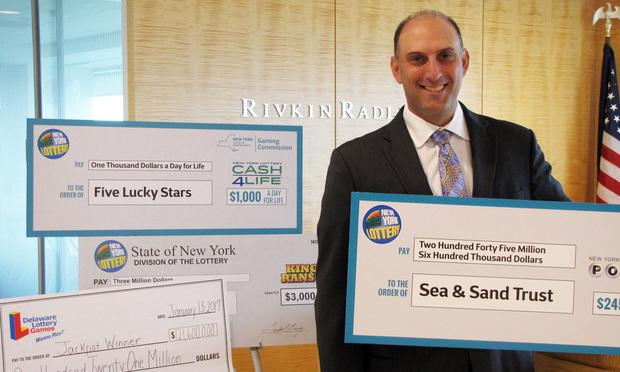Dear Mega Millions Jackpot Winner: Call Me. Sincerely, Lottery Lawyers
"Winners understand that this was complete luck, that this could have been anybody and the odds of them winning are so ridiculous that they can't believe it was them. They want to do the right thing by their friends and family, but what friends and family don't realize is that they're just one friend and one family member. There may be 50 others," said lottery lawyer Jason Kurland of Rivkin Radler in New York.
October 23, 2018 at 10:53 AM
8 minute read
 Jason M. Kurland of Rivkin Radler in New York. Courtesy photo.
Jason M. Kurland of Rivkin Radler in New York. Courtesy photo.
It's the problem everyone wishes they had. Who to turn to after a $1.6 billion lottery win? The record-breaking Mega Millions jackpot, which has birthed a new hashtag, #IfIWonABillionDollars, hasn't seen a winner since July 25, and the odds of winning stand at about one in 303 million.
But here's some legal advice for the winner—you know, just in case.
Lottery lawyer Jason M. Kurland of Rivkin Radler in New York recommends signing the ticket before doing anything else. That's because it's a bearer instrument, which means, as Kurland notes, that “whoever hands it in to the Lottery Commission with their name on the back of it is the winner.”
In other words: Losing an unsigned ticket means also losing the prize.
Kurland stresses the importance of lawyering up, because going it alone is often “too overwhelming” for a lottery winner.
“You're in a world that you're not accustomed to being in,” Kurland said. “So if you have an advocate who's been there before, someone who you know has your back, it's really invaluable.”
 Losing an unsigned ticket, means also losing the prize. Mega Millions Florida lottery ticket. Photo: Boofoto/Shutterstock.com.
Losing an unsigned ticket, means also losing the prize. Mega Millions Florida lottery ticket. Photo: Boofoto/Shutterstock.com.States such as Delaware, Kansas, Maryland, North Dakota, Ohio, South Carolina and Texas allow winners to keep their identities secret, but most don't. And under most Right-to-Know laws, that information falls under the public records umbrella. The reasoning: It doesn't aid public trust in the lottery process to have all winners remain anonymous.
'Let Someone Else Sign the Back of a $1.6 Billion Ticket'
To the lucky winner, “be prepared to be contacted by media—and long lost relatives,” said Miami bankruptcy lawyer Monique D. Hayes, who advises securing home and family before going public.
That's easier to do in states such as Pennsylvania, which have allowed winners to have an independent trustee, usually an attorney, sign the lottery ticket and then send the money to a trust account.
Related: Fox Rothschild Lawyer Claims $457M Jackpot Ticket With Trust
In March, New Hampshire Judge Charles S. Temple ruled that the winner of a $560 million Powerball jackpot could remain a Jane Doe after she'd signed the ticket, but did allow the name of her town, Merrimack, to become public.
That said, Kurland “would not blame” the winner for signing the ticket and “just dealing with” the resulting publicity. “It's very scary to let someone else sign the back of a $1.6 billion ticket,” he said.
In March, Andrew D. Santana, managing partner of Fox Rothschild in Pennsylvania, signed a winning lottery ticket on behalf of an anonymous client, who sent the funds to an entity called Emerald Legacy Trust.
The $273.9 million cash prize became $199.8 million after taxes.
According to Santana, he had to “threaten” litigation with the Department of Revenue to maintain confidentiality.
“I had a lot of phone calls from a lot of different people who were trying to get them. They'd offer me investment opportunities,” Santana said. “There were charitable people and other strange phone calls from people who claimed the ticket was stolen from them.”
Santana worked with financial advisory firms and services to help his client manage the money without revealing the winner's identity.
California trust and estates attorney Richard M. Aaron, of Dowling Aaron Inc., pointed out that his state and many others that prohibit anonymity don't force winners to have pictures taken.
In Aaron's mind, appearing on TV is ”a serious error in judgment,” as it makes winners and their family ”targets to everything from charities, both phony and legitimate, friends, distant relatives, neighbors, complete strangers, financial scammers and maybe worse.”
What could go wrong?
In November 2015, Craigory Burch Jr. landed more than $400,000 in the Georgia lotto, before being murdered by seven masked man who broke into his home, demanding money. According to police, Burch was a “preselected” target, and had posed for a photo with a gigantic check two months earlier.
'They Are Giddy'
“What people generally don't realize is that with sudden wealth comes sudden responsibilities and problems,” Aaron said.
Having dealt with many clients who have “suddenly become wealthy,” including lottery winners, professional athletes and business owners selling their shop, Aaron said he's witnessed clients struggle to grasp “what wealth really means.”
“When an ordinary person wins a lot of money, they feel a rush of emotions. They are giddy,” he said. “Then they can go from feeling fortunate to feeling guilty, and from being happy to feeling targeted. All of these emotions can leave a lottery winner feeling distressed.”
The best way to mitigate the chaos, according to Aaron, is to set up boundaries and procedures—both personal and financial.
“Even a big number is finite,” he said.
This content has been archived. It is available through our partners, LexisNexis® and Bloomberg Law.
To view this content, please continue to their sites.
Not a Lexis Subscriber?
Subscribe Now
Not a Bloomberg Law Subscriber?
Subscribe Now
NOT FOR REPRINT
© 2025 ALM Global, LLC, All Rights Reserved. Request academic re-use from www.copyright.com. All other uses, submit a request to [email protected]. For more information visit Asset & Logo Licensing.
You Might Like
View All
Rupert Murdoch Trust Trial Underscores Lucrative Nature of High-End Private Client Practices

People of Bikini Claim 'No Questions Asked' Practices Resulted in Trusts' Depletion
3 minute read
Miami Judge Grants Class Certification to Royal Caribbean Workers: $500M at Stake

NY Court System to Appeal Decision That Reduces Chief Judge's Appointing Authority in Surrogate Courts
Trending Stories
Who Got The Work
J. Brugh Lower of Gibbons has entered an appearance for industrial equipment supplier Devco Corporation in a pending trademark infringement lawsuit. The suit, accusing the defendant of selling knock-off Graco products, was filed Dec. 18 in New Jersey District Court by Rivkin Radler on behalf of Graco Inc. and Graco Minnesota. The case, assigned to U.S. District Judge Zahid N. Quraishi, is 3:24-cv-11294, Graco Inc. et al v. Devco Corporation.
Who Got The Work
Rebecca Maller-Stein and Kent A. Yalowitz of Arnold & Porter Kaye Scholer have entered their appearances for Hanaco Venture Capital and its executives, Lior Prosor and David Frankel, in a pending securities lawsuit. The action, filed on Dec. 24 in New York Southern District Court by Zell, Aron & Co. on behalf of Goldeneye Advisors, accuses the defendants of negligently and fraudulently managing the plaintiff's $1 million investment. The case, assigned to U.S. District Judge Vernon S. Broderick, is 1:24-cv-09918, Goldeneye Advisors, LLC v. Hanaco Venture Capital, Ltd. et al.
Who Got The Work
Attorneys from A&O Shearman has stepped in as defense counsel for Toronto-Dominion Bank and other defendants in a pending securities class action. The suit, filed Dec. 11 in New York Southern District Court by Bleichmar Fonti & Auld, accuses the defendants of concealing the bank's 'pervasive' deficiencies in regards to its compliance with the Bank Secrecy Act and the quality of its anti-money laundering controls. The case, assigned to U.S. District Judge Arun Subramanian, is 1:24-cv-09445, Gonzalez v. The Toronto-Dominion Bank et al.
Who Got The Work
Crown Castle International, a Pennsylvania company providing shared communications infrastructure, has turned to Luke D. Wolf of Gordon Rees Scully Mansukhani to fend off a pending breach-of-contract lawsuit. The court action, filed Nov. 25 in Michigan Eastern District Court by Hooper Hathaway PC on behalf of The Town Residences LLC, accuses Crown Castle of failing to transfer approximately $30,000 in utility payments from T-Mobile in breach of a roof-top lease and assignment agreement. The case, assigned to U.S. District Judge Susan K. Declercq, is 2:24-cv-13131, The Town Residences LLC v. T-Mobile US, Inc. et al.
Who Got The Work
Wilfred P. Coronato and Daniel M. Schwartz of McCarter & English have stepped in as defense counsel to Electrolux Home Products Inc. in a pending product liability lawsuit. The court action, filed Nov. 26 in New York Eastern District Court by Poulos Lopiccolo PC and Nagel Rice LLP on behalf of David Stern, alleges that the defendant's refrigerators’ drawers and shelving repeatedly break and fall apart within months after purchase. The case, assigned to U.S. District Judge Joan M. Azrack, is 2:24-cv-08204, Stern v. Electrolux Home Products, Inc.
Featured Firms
Law Offices of Gary Martin Hays & Associates, P.C.
(470) 294-1674
Law Offices of Mark E. Salomone
(857) 444-6468
Smith & Hassler
(713) 739-1250










